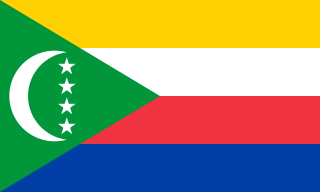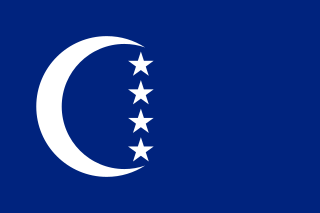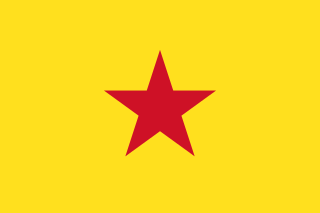
Politics of the Union of the Comoros takes place in a framework of a federal presidential republic, whereby the President of the Comoros is both head of state and head of government, and of a multi-party system. Executive power is exercised by the government. Federal legislative power is vested in both the government and parliament.

The Twelfth Amendment to the United States Constitution provides the procedure for electing the President and Vice President. It replaced the procedure provided in Article II, Section 1, Clause 3, by which the Electoral College originally functioned. The amendment was proposed by the Congress on December 9, 1803, and was ratified by the requisite three-fourths of state legislatures on June 15, 1804. The new rules took effect for the 1804 presidential election and have governed all subsequent presidential elections.

The Twenty-third Amendment to the United States Constitution extends the right to vote in presidential elections to citizens residing in the District of Columbia. The amendment grants the district electors in the Electoral College as though it were a state, though the district can never have more electors than the least-populous state. The Twenty-third amendment was proposed by the 86th Congress on June 16, 1960, and was ratified by the requisite number of states on March 29, 1961.

The District of Columbia Voting Rights Amendment was a proposed amendment to the United States Constitution that would have given the District of Columbia full representation in the United States Congress, full representation in the Electoral College system, and full participation in the process by which the Constitution is amended.

Parliamentary elections were held in the Comoros on 18 April 2004, with a second round on 25 April. The result was a victory for the Camp of the Autonomous Islands, which won 12 of the 18 elected seats.

Elections in the Comoros take place within the framework of a multi-party democracy and a presidential system. The President and the majority of the seats in the Assembly of the Union are directly elected.

Presidential elections were held in the Comoros on 16 April and 14 May 2006. As it was the turn of the island of Anjouan to hold the union presidency, a primary election was held in Anjouan on 16 April, prior to a national election on 14 May. The result was a victory for Ahmed Abdallah Mohamed Sambi, who received 58% of the vote in the national election.
The Comoros is an island nation in the Indian Ocean, located off the eastern coast of Africa. France first established colonial rule in the Comoros in 1841. Agreement was reached with France in 1973 for the Comoros to become independent in 1978. On July 6, 1975, but the Comorian parliament passed a unilateral resolution declaring independence. The deputies of Mayotte, which remained under French control, abstained. Referendums on all four of the islands excluding Mayotte showed strong support for independence. Ahmed Abdallah proclaimed the Comoros' independence on September 5, 1975 and became its first president.

A constitutional referendum was held in the Comoros on 17 May 2009. The constitutional amendments were approved with 93.9% in favour, with a turnout of 51.8%.

An independence referendum was held in the Comoros on 22 December 1974. The overall result was a strong "yes" vote, with 94.57% of voters voting for independence and almost all the "no" votes being cast in Mayotte, where there was a majority for remaining under French control. In contrast, on Mohéli only five out of 6,059 votes were against independence. Voter turnout was 93.3%.

A constitutional referendum was held in the Comoros on 5 November 1989. The proposed amendments to the constitution would allow incumbent President Ahmed Abdallah to run for a third term, as well as creating the post of Prime Minister. The changes were approved by 92.5% of voters.

A constitutional referendum was held in the Comoros on 7 June 1992. The proposed amendments to the constitution were approved by 76% of voters, with voter turnout at around 64%.

A constitutional referendum was held in the Comoros on 20 October 1996. The proposed amendments would set the presidential term at 6 years, create a unicameral parliament, and limit the authority of the individual islands' parliaments. The proposals were approved by 85% of voters, with a turnout of around 64%.

Presidential elections were held in the Comoros in 2002. In accordance with the new constitution approved in a referendum the previous year, the island of Grande Comore was to provide the candidates for this election as part of a rotation agreement between the three islands. A first round was held on Grande Comore on 17 March, after which the top three candidates, Azali Assoumani, Mahamoud Mradabi and Saïd Ali Kemal went through to a second, national round of voting on 14 April. However, both Mradabi and Kemal boycotted the second round, leaving first round winning Assoumani as the only candidate.
A constitutional referendum was held in the Northern Mariana Islands on 6 November 2012, alongside the election for the islands' representative to the United States House of Representatives. Voters were asked whether they approved of three proposed amendments to the constitution. All three were approved.

A constitutional referendum was held in the Comoros on 30 July 2018. The constitutional amendments proposed would remove the presidential term limits and requirement for the presidency to rotate between the three main islands. Following the approval of the amendments by 92% of voters, President Azali Assoumani will be allowed to run for another five-year term in a vote moved forward to 2019 instead of 2021.

Early presidential elections will be held in the Comoros on 24 March 2019 alongside regional elections. If required, a second round will be held on 21 April.






